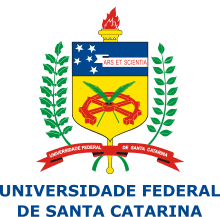Federal University of Santa Catarina
 | |
Other names | UFSC |
|---|---|
| Motto | Ars et Scientia |
Motto in English | Arts and Science |
| Type | Public |
| Established | 1960 |
| Rector | Luis Carlos Cancellier de Olivo |
Administrative staff | 4,539 |
| Undergraduates | 29595 |
| Postgraduates | 14233 |
| Location | Florianópolis, Santa Catarina, Brazil |
| Campus | Urban |
| Website | www.ufsc.br |
The Federal University of Santa Catarina (Portuguese: Universidade Federal de Santa Catarina, UFSC) is a public university in Florianópolis, the capital city of Santa Catarina in southern Brazil. Ranked as the 9th best overall university in Latin America by the Webometrics Ranking of World Universities 2016, it is one of the leading Latin American research universities, being the third largest university in Brazil and the fifth in Latin America, noted for its engineering school, and the only Federal University in the state of Santa Catarina. UFSC is internationally known for the quality of its courses in architecture & urbanism, mechanical engineering, automation and control engineering, sanitary and environmental engineering, electrical engineering, chemistry and dentistry.
The structure of its campus comprises 11 Academic Schools (Centros de Ensino), divided by field of study. Every School is divided in departments, the largest one being the Department of Mechanical Engineering. The oldest school at UFSC is the School of Law. The Department of Law was the first of UFSC's departments to be officially recognized in 1932.
History
The history of the Federal University of Santa Catarina has its roots in the Polytechnic Institute of Florianópolis founded on March 13 of 1917 by José Arthur Boiteux. Organized as a free institute, it was the first college degree institution of Santa Catarina state. On February 11, 1932 the Law School was incorporated, officially in 1935.
That triggered a movement to start the first state university and on December 18 of 1960 it became the University of Santa Catarina, offering the courses of Law, Medicine, Pharmacy, Philosophy, Economics, Social Service and the School of Industrial Engineering. On July 15, 1968, as an effort of Brazilian government to improve college education in Brazil with education reform, the major universities in Brazil were reorganized in Schools and Departments and acquired a new education structure, more resembling the American and English methodology. Since then the university became the Federal University of Santa Catarina.
In 1961 the institution has earned a new place in the city to build its structure, located in the region of Trindade near downtown Florianópolis. The area was previously occupied by a model farm called Assis-Brasil and is located near the coast, having several streams crossing the actual campus. The moving was finished in 1980.
A young university, the Federal University of Santa Catarina continues to grow. During the 1980s, it began to invest heavily in the expansion of graduate programs and research, besides supporting the creation of technology centers in the state of Santa Catarina and the development of a number of outreach projects for the community. Today, UFSC has four other campuses distributed in the cities of Araranguá, Blumenau, Curitibanos and Joinville.[1]
 First installation of the Law school
First installation of the Law school
Admissions
The Universidade Federal de Santa Catarina undergraduate admission process is almost similar to all others in Brazil, using written tests called vestibular. In late years this process of admission has been criticized and altered. In 2007 the institution approved the Affirmative Action quota system proposed by the Ministry of Education in early Luis Inácio Lula da Silva government, which now makes 50% of places for incoming students available to students coming from public schools and racial minorities.
The admission process for graduate school is more complex and usually involves a test and a recommendation from the previous college. People interested in graduate degrees at UFSC should contact the department of the intended program directly. The Brazilian Ministry of Education, through CAPES (Coordenação de Aperfeiçoamento de Pessoal do Nível Superior, Superior Level Personnel Enhancement Coordination) evaluates graduate programs in Brazil every three years, ranking them from 1 (worst) to 7, being 6 excellence and 7 international excellence level.
The following graduate programs at UFSC have received grades 6 or 7, as per the last CAPES evaluation (2013):[2]
- Aquaculture
- Chemical Engineering
- Chemistry
- Civil Engineering
- Electrical Engineering
- Food Engineering
- Food Science
- Interdisciplinary Studies in Human Sciences
- Law
- Linguistics
- Mechanical Engineering
- Nursing
- Plant Genetic Resources
- Pharmacology
- Philosophy
- Scientific and Technological Education
Numbers
2016 numbers, provided by the institution.
- 119 undergraduate programs;
- 82 Master’s degree programs;
- 55 Doctoral degree programs;
- 45,006 students (total);
- 2,670 professors;
- 3,242 administrative staff.
Academic Schools
- School of Agricultural Sciences – CCA
- School of Biological Sciences - CCB
- School of Communication and Arts - CCE
- School of Education - CED
- School of Health Sciences – CCS
- School of Law – CCJ
- School of Philosophy and Human Sciences - CFH
- School of Physical and Mathematical Sciences - CFM
- School of Sports – CDS
- School of Socio-Economic Sciences - CSE
- School of Technology - CTC
Notable faculty
- Alvaro Toubes Prata, professor of Mechanical Engineering, member of the Brazilian Academy of Sciences
- Sergio Colle, professor of Mechanical Engineering, member of the National Academy of Engineering
See also
References
External links
- University website (in Portuguese)
Coordinates: 27°36′04″S 48°31′12″W / 27.60111°S 48.52000°W